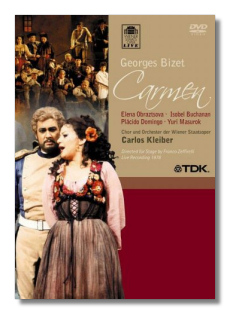
The Internet's Premier Classical Music Source
Related Links
- Bizet Reviews
- Latest Reviews
- More Reviews
-
By Composer
-
Collections
DVD & Blu-ray
Books
Concert Reviews
Articles/Interviews
Software
Audio
Search Amazon
Recommended Links
Site News
 DVD Review
DVD Review
Georges Bizet

Carmen
- Elena Obraztsova (Carmen)
- Placido Domingo (Don José )
- Yuri Mazurok (Escamillo)
- Isobel Buchanan (Micaëla)
Vienna State Opera Orchestra & Chorus/Carlos Kleiber
TDK DVD DVUS-CLOPCAR 154min 4:3 Fullscreen LPCM stereo
The Viennese were delighted when the elusive Carlos Kleiber agreed to conduct this production at the Vienna Staatsoper in December 1978. (The performance presented here was televised by Austrian television.) There must also have been curiosity about the Russians in the cast – Obraztsova and Mazurok – and about the direction (both for the stage and for the television cameras) of Franco Zeffirelli. Add one of the world's most popular tenors and (oh yes) an opera almost everyone loves, and you have a good reason to stay home and watch TV.
This is a typical Zeffirelli production. The stage is almost always crowded with physically attractive supers, and even the choristers seem to have been chosen more for their looks than for their ability to produce a full, blended sound. At times, the principals get lost in the crowd. Also, no opportunity to introduce stage business – and horses and donkeys! - has been missed. I imagine that this was more distracting to audience members than it is on video. Sometimes Zeffirelli's direction runs contrary to the libretto. For example, at the end of the first act, Carmen, instead of pushing Don José, drops a canopy on his head. If you like your operas to be directed and filmed as if they were Hollywood movies, then Zeffirelli is your man.
Kleiber pushes score along as if he were running the bulls in Pamplona. Accents are leaped upon with vicious precision, and while there is excitement galore, there is precious little charm, subtlety, or respite. A French opera? Not in this production, which both musically and dramatically is as subtle as a flying paella pan. Kleiber elects to use a version of the score which is neither fish nor fowl, using spoken dialogue here, recitatives there, and whatever suits him among the various changes which the score underwent in its genesis and early productions. It was a mistake to have Carmen and Don José speak their first dialogue right over the orchestra's statement of the Fate motif; they detract from each other, and Obraztsova can't even be heard properly. Kleiber even goes so far as to move the last act's entr'acte right into the middle of the choruses which open that act, providing the flamenco dancers with another opportunity to strut their stuff.
Obraztsova is a high-powered and fun-loving Carmen – no creature haunted by Fate until she sees her death in the cards. She doesn't shy away from using her chest voice campily, and her upper registers are no less thrilling. She even interpolates a high note in the Seguidille. She has a tendency to sing sharp however. Domingo, in curly and increasingly grey wigs, is a predictably excellent Don José . His Act One duet with Micaëla is gorgeous, and his Flower Song brings the house down. Like Obraztsova, Mazurok's command of the French language is questionable, but his Escamillo has undeniable charisma. And what a voice! Isobel Buchanan was an eleventh-hour addition to the cast, but her touching Micaëla is finely acted and sung. Everyone sings too loudly, though – Kleiber's fault, I think, for not reining in the orchestra. The smaller roles are done well, but again, there's some sub-par French from the German-speaking members of the cast.
TDK apologizes for the quality of the picture, but apart from some passing "snow" and the darkness of the two middle acts, it's not bad. They might have apologized for the sound instead, which is cavernous and not always friendly to the voices. There are no bonuses. Most of the applause at the curtain calls has been retained, however, which gives the viewer a pleasant "you are there" feeling. The English subtitles are good. The picture format is 4:3, and the sound is LPCM stereo.
Copyright © 2005, Raymond Tuttle




















